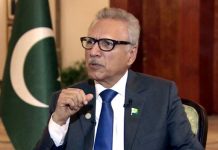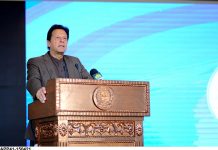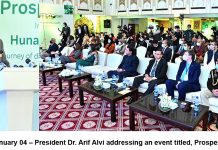NEW DELHI – The issues of Jammu Kashmir and terrorism kept both Pakistan and India from taking a common position and there was no joint statement at the end of almost 100-minute meeting here at South Block’s corner office, the Indian media reported.
The Hindu newspaper reported that the much-anticipated talks between Foreign Secretary Aizaz Ahmad Chaudhry and India’s External Affairs Secretary S Jaishankar ‘failed’ to make headway on the Comprehensive Bilateral Dialogue, with both sides trading allegations.
Aizaz-led delegation pointed out that the Indian intelligence agencies were responsible for the unrest in Balochistan. Pakistan supported the Comprehensive Bilateral Dialogue while India made no mention of the dialogue process. On the occasion, the visiting secretary described Jammu Kashmir as the core issue, echoing Pakistan’s traditional position on the status of the disputed state.
“Our secretary conveyed that Pakistan cannot be in denial on the impact of terrorism on the bilateral relationship. Terrorist groups targeting India must not be allowed to operate with impunity,” the paper quoted unidentified Indian official as saying after the meeting. Aizaz conveyed Pakistan’s concern about developments in the Samjhauta Express blasts case.
“Our secretary also conveyed concerns over the environment being created in India for the release of the prime suspects of the Samjhauta blasts. He further pointed out that, despite repeated requests, India has not shared investigation reports in which 42 Pakistanis lost their lives,” the paper quoted an official of the Pakistan High Commission.
The Indian Express newspaper reported that there was no indication that the two countries had been able to unlock the diplomatic deadlock and resume the dialogue process. The secretaries raised issues of concern, sticking to stated positions and rhetoric.
“The discussions were frank and constructive. But it was a heated but candid meeting,” the paper quoted an Indian official, privy to the meeting, as saying. Jaishankar firmly rebutted ‘allegations’ of India’s involvement in Balochistan or other areas. “Which spy agency would put their agent in the field with their own passport, and without a visa,” the paper quoted the Indian secretary as saying.
The discussions also moved towards humanitarian issues including those pertaining to fishermen and prisoners, and people-to-people contacts including religious tourism. The paper reported that there was hardly any common ground on the contentious issues. India’s Ministry of External Affairs said that the two foreign secretaries exchanged ideas on taking the relationship forward and agreed to remain in touch.
From the statements, it would appear to any ordinary citizen that Pakistan and India were almost in an eyeball-to-eyeball confrontation mode, albeit with all the niceties of diplomatic protocol intact, according to the First Post paper. “From the quick official statements or the tweets fired by the two sides, it does not appear that it was a friendly talk,” it said.
– Kashmiri leadership on talks –
In a statement issued in Srinagar, Hurriyat Conference headed by Mirwaiz Dr Umar Farooq welcomed the secretary-level talks between Pakistan and India on the sidelines of the ‘Heart of Asia’ conference in New Delhi, saying both the countries should attempt to create conducive atmosphere to carry forward the dialogue process.
“The Indo-Pakistan foreign secretary-level talks on the sidelines of Heart of Asia conference is a good sign and it is hoped that both the countries will shun the confrontational attitude and adopt meaningful dialogue to resolve all outstanding issues including Jammu Kashmir,” he said. “It is hoped that conducive atmosphere will be created to carry forward the dialogue process,” the statement said.
National Conference president Dr Farooq Abdullah also welcomed the secretary-level talks, saying both Pakistan and India should show consistency and political will to engage in a sustained dialogue aimed at resolving all outstanding issues including Jammu Kashmir. Although the resumption of the talks was a positive sign, Islamabad and New Delhi should not sideline Kashmiri stakeholders and leadership in any structured engagement as this would have adverse political implications in the divided state, he said.










